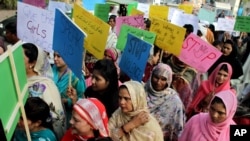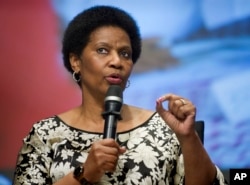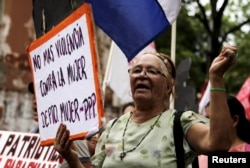While a United Nations report last month announced that worldwide advances mean women are living longer, healthier lives with better education, for the next 16 days the organization will be focused on ending gender-based violence and discrimination against many of those same women.
November 25 is International Day for the Elimination of Violence Against Women. The U.N.'s "Orange the World" campaign runs through December 10, International Human Rights Day, and will attempt to raise awareness about the violent realities faced by many of the world's women and girls.
"Violence against women and girls remains one of the most serious -- and the most tolerated – human rights violations," said Phumzile Mlambo-Ngcuka, a U.N. Under Secretary-General and executive director of U.N. Women, in a statement.
'Cause and a consequence'
"It [violence] is both a cause and a consequence of gender inequality and discrimination," Mlambo-Ngcuka said. "Although there is no single solution to such a complex problem, there is growing evidence of the range of actions that can stop violence before it happens, especially if they are implemented in parallel."
Last month, with the release of The World's Women 2015 report, U.N. Secretary-General Ban Ki-moon said, “Far too many women and girls continue to be discriminated against, subjected to violence, denied equal opportunities in education and employment, and excluded from positions of leadership and decision-making."
The numbers regarding violence against women and girls are staggering, according to the UN:
- Globally, 35 percent of women and girls experience some form of physical and or sexual violence in their lifetime with up to 7-in-10 women facing this abuse in some countries.
- Globally, as many as 38 percent of murders of women are committed by an intimate partner.
- An estimated 133 million girls and women have experienced some form of female genital mutilation in the 29 countries in Africa and the Middle East where the harmful practice is most common.
- Worldwide, more than 700 million women alive today were married as children, 250 million of whom were married before the age of 15. Girls who marry before the age of 18 are less likely to complete their education and more likely to experience domestic violence and complications in childbirth.
- An estimated 58 million children of primary school age are out of school worldwide. More than half of them are girls and nearly three-quarters live in sub-Saharan Africa and Southern Asia. Although the vast majority of the world’s youth is currently literate, nearly two-thirds of the world’s illiterate adults are women, a proportion unchanged for the last 20 years.
The United Nations defines violence against women as "any act of gender-based violence that results in, or is likely to result in, physical, sexual or mental harm or suffering to women, including threats of such acts, coercion or arbitrary deprivation of liberty, whether occurring in public or in private life."
The 16 Days of Activism Against Gender-Based Violence campaign is an international effort aimed at creating awareness and starting action to end violence against women.
Globally, more than 450 events are planned in more than 70 countries throughout the 16 days, according to the U.N. Events will include rallies, speeches, marches, social media drives, and film, dance and theater performances.
The color orange, which has come to symbolize the effort, will also light up major landmarks, including the Niagara Falls, the European Commission building in Brussels, the Little Mermaid statue in Copenhagen in Denmark, and the Palais de Justice in the Democratic Republic of the Congo.
Other dates falling within the 16-day stretch include International Women Human Rights Defenders Day on November 29, World AIDS Day on December 1, and the December 6 anniversary of the Montreal Massacre, a gender-based mass shooting in which 14 women were killed in 1989.
The campaign calls for the elimination of violence against women by raising awareness about gender-based violence as a human rights issue, strengthening work at the local level regarding violence against women, and developing tools to pressure governments to implement promises made to eliminate gender-based violence, among other things.
Women's rights defenders
Research released earlier this year found that despite a global momentum to end violence against women and girls, women's rights defenders are at higher risk of violence now than two years ago.
A poll in June by ActionAid of 47 women's rights defenders in more than 20 countries found that almost two-thirds felt their safety and security had deteriorated in the past two years.
"Women activists from countries as diverse as Afghanistan, Nigeria, South Africa, Brazil and the USA have all seen threats of and violence increase ... hampering their efforts to improve women's lives and end violence in society," Lucia Fry, head of policy at ActionAid, said in a statement.
The women reported threats from political groups, including armed militias, governments and religious groups.
"Opposition groups have repeatedly threatened me," Samira Hamidi from the Afghan Women's Network said in the survey, which was reported on by Reuters. "There are no prevention and protection mechanisms by my government where any women, but particularly women human rights defenders, can be supported."
Some information for this report came from Reuters.
















